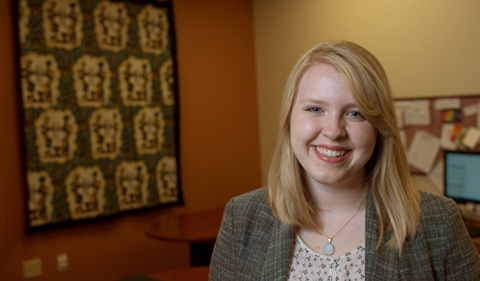By Christopher Caldwell
From working at a cheetah conservation last summer in South Africa to spending a day with Nelson Mandela’s niece, Camille Smith ’16 knows that her heart has been drawn to a life of African study.
With a bachelor’s degree in African American Studies, a double minor in Journalism and Sociology, and a certificate in Global Leadership, Smith is tailoring her education at Ohio University for a wide variety of career and graduate school choices. She has a plentitude of aspirations she wants to fulfill, but all of her goals are focused on becoming an eminent Africana scholar.
Smith recognizes that in order for genuine interracial understanding to occur, attempts to create identification have to start with people who benefit from white privilege. Being an outsider is one hurdle that Smith has had to jump in her attempt to become more knowledgeable. She turned a few heads when she went to a Kwanzaa celebration last year. But when folks in the room saw that she was there in support of, and to learn from, her black friends, tensions came down.
“I can never understand what it is that my friends go through,” she says, “but I can be respectful, and I can be empathetic.” Respect and empathy are central aspects to a degree in African American Studies.
‘I Can’t Do Just One Thing for the Rest of My Life’
Always have an exit strategy. Smith is a firm believer of this very simple, and yet oftentimes difficult to accomplish, maxim.
“I can’t do just one thing for the rest of my life,” Smith says. “Giving myself multiple career and study pathways to choose from after undergrad is important.”
Smith sees her future as one of vibrant possibility. Though she may never go to the moon or solve the challenge of world hunger, she has some big plans to carve out a niche for herself.
“I am applying to grad school, a Fulbright for east Africa, a Boren International scholarship, and I am studying Swahili.” Despite the broad nature of Smith’s applications, they are 100 percent focused on putting her knowledge into practice and expanding her understanding of a group of people with whom she is not directly a part.
‘What Are You Going To Do with That Degree?’
“When you are an African American Studies major, you will be asked, ‘What are you going to do with that degree?’ The key is to know that an AAS major is not limited,” says Smith. So what can someone do with all the intangible skills African American Studies has to offer? A whole lot, says Smith. Just about every business in the United States has at least one person of color as a client, working for, or leading the company. Being aware of difference and having the cultural sensitivity to embrace and celebrate it are two very different things. Whether working in higher education as a Resident Assistant or leading a business, taking the time to become knowledgeable of the black community is central for Smith.
So much of higher education is too streamlined, she says. “A pre-law student will take pre-law classes to go to law school to become a lawyer. There is no set path for African American Studies, no singular career field.” It is the vast array of future possibilities that excites her.
Whether she ends up working in a museum, on an animal preserve, or in the halls of academia, Smith is prepared to be a lifelong learner who can engage with a wide variety of people. By constantly developing coherent exit strategies, Smith has given herself a rich educational experience by refusing to shut herself in a color blind comfort zone.




















Comments